LDRS 612 Leading Change - Transformational Servant Leadership Style
VerifiedAdded on 2023/06/10
|10
|860
|257
Presentation
AI Summary
This presentation defines transformational servant leadership (TSL) as a style that combines transformational and servant leadership, focusing on leading followers towards targets through training and mentoring. It highlights the crucial role of effective communication in TSL, particularly in change management, motivation, and sustainability. Effective communication enables transformative leaders to manage conflicts, motivate followers to embrace change, and communicate the benefits of adapting to market changes. The presentation emphasizes building a continuous stream of communication to influence subordinates and foster trust through strengthening formal communication channels, training and mentoring employees, and utilizing social media. It concludes by referencing various academic sources to support the concepts discussed.
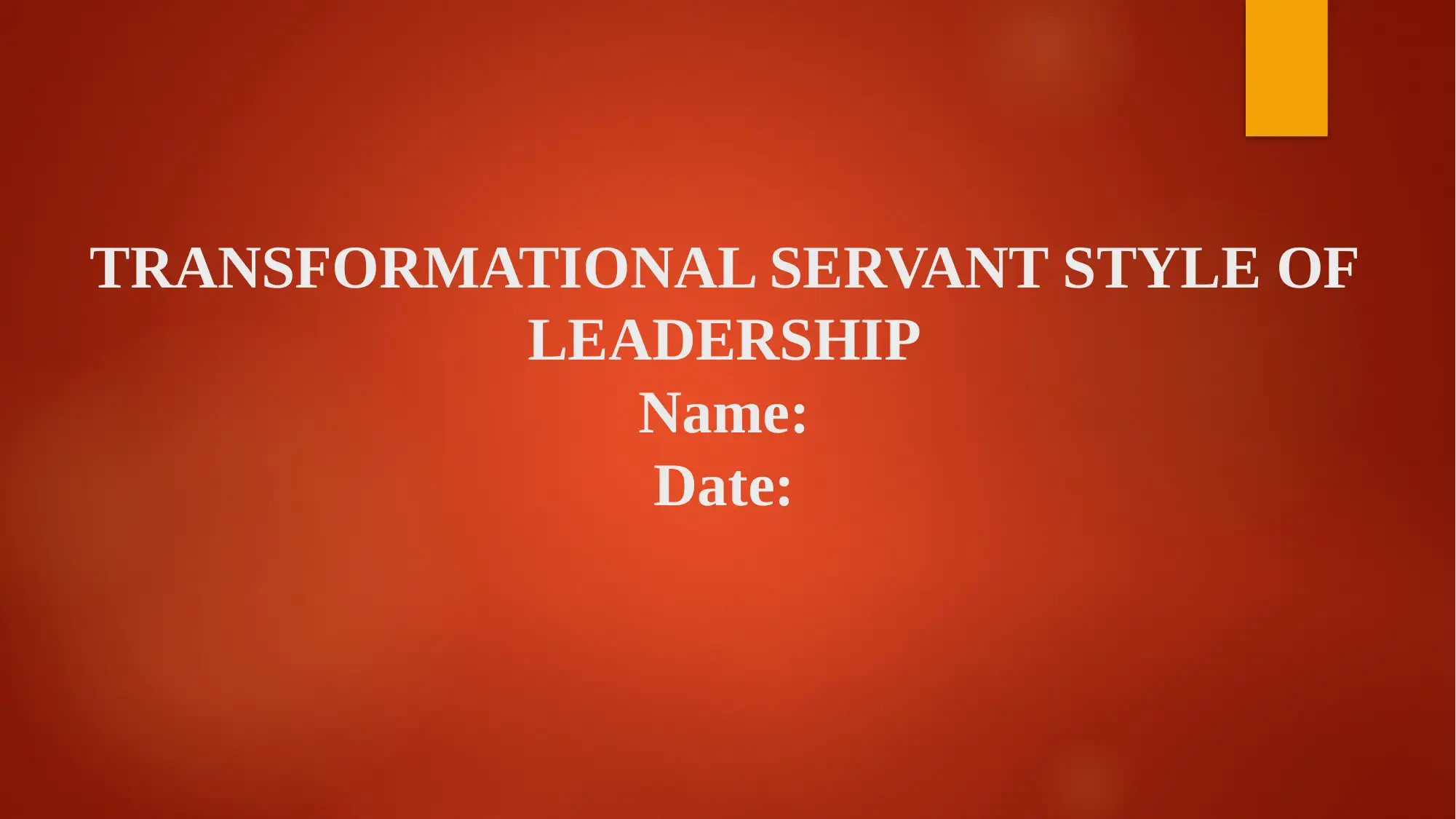
TRANSFORMATIONAL SERVANT STYLE OF
LEADERSHIP
Name:
Date:
LEADERSHIP
Name:
Date:
Paraphrase This Document
Need a fresh take? Get an instant paraphrase of this document with our AI Paraphraser
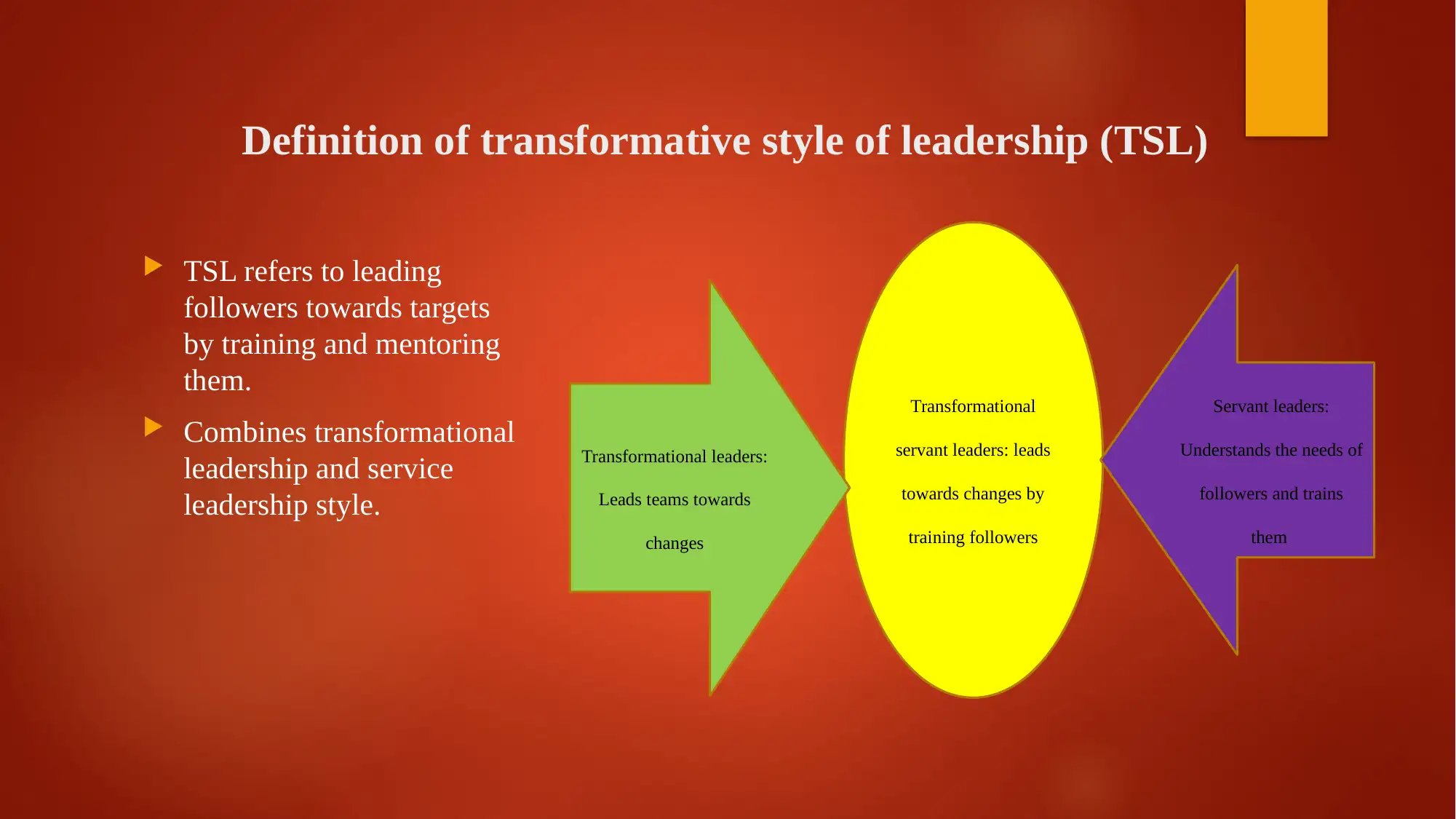
Definition of transformative style of leadership (TSL)
TSL refers to leading
followers towards targets
by training and mentoring
them.
Combines transformational
leadership and service
leadership style.
Transformational
servant leaders: leads
towards changes by
training followers
Transformational leaders:
Leads teams towards
changes
Servant leaders:
Understands the needs of
followers and trains
them
TSL refers to leading
followers towards targets
by training and mentoring
them.
Combines transformational
leadership and service
leadership style.
Transformational
servant leaders: leads
towards changes by
training followers
Transformational leaders:
Leads teams towards
changes
Servant leaders:
Understands the needs of
followers and trains
them
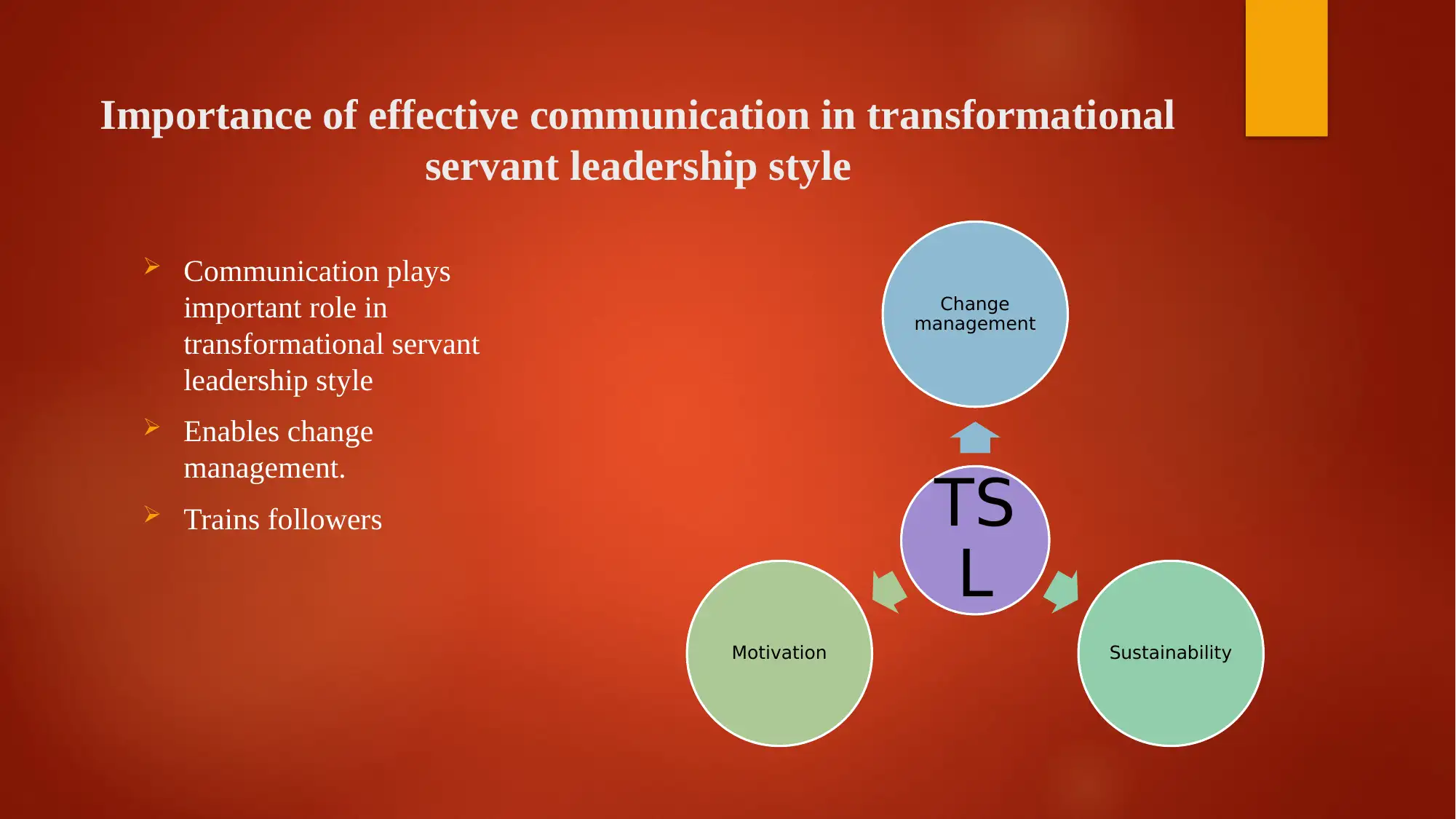
Importance of effective communication in transformational
servant leadership style
Communication plays
important role in
transformational servant
leadership style
Enables change
management.
Trains followers TS
L
Change
management
SustainabilityMotivation
servant leadership style
Communication plays
important role in
transformational servant
leadership style
Enables change
management.
Trains followers TS
L
Change
management
SustainabilityMotivation
⊘ This is a preview!⊘
Do you want full access?
Subscribe today to unlock all pages.

Trusted by 1+ million students worldwide
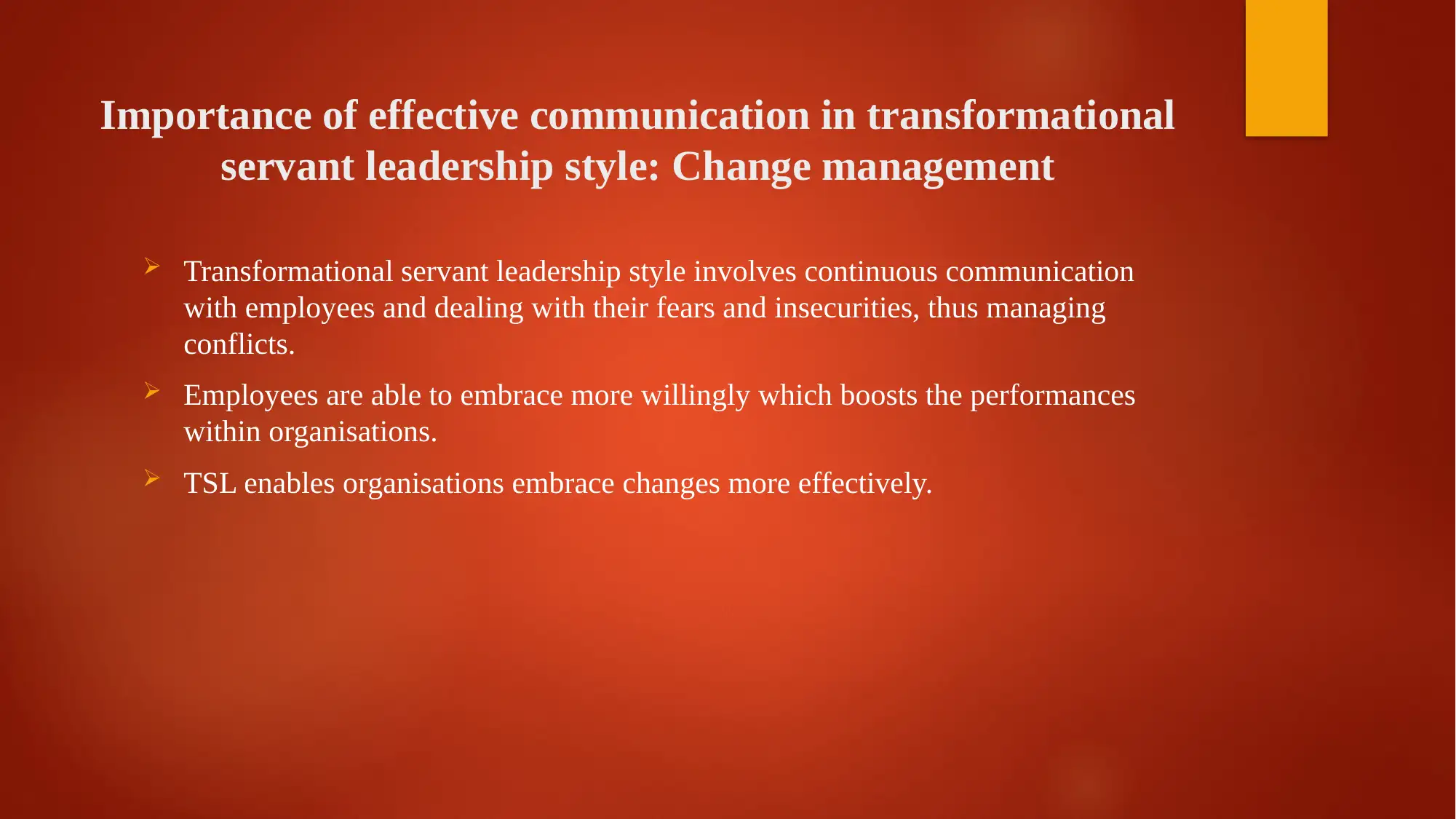
Importance of effective communication in transformational
servant leadership style: Change management
Transformational servant leadership style involves continuous communication
with employees and dealing with their fears and insecurities, thus managing
conflicts.
Employees are able to embrace more willingly which boosts the performances
within organisations.
TSL enables organisations embrace changes more effectively.
servant leadership style: Change management
Transformational servant leadership style involves continuous communication
with employees and dealing with their fears and insecurities, thus managing
conflicts.
Employees are able to embrace more willingly which boosts the performances
within organisations.
TSL enables organisations embrace changes more effectively.
Paraphrase This Document
Need a fresh take? Get an instant paraphrase of this document with our AI Paraphraser
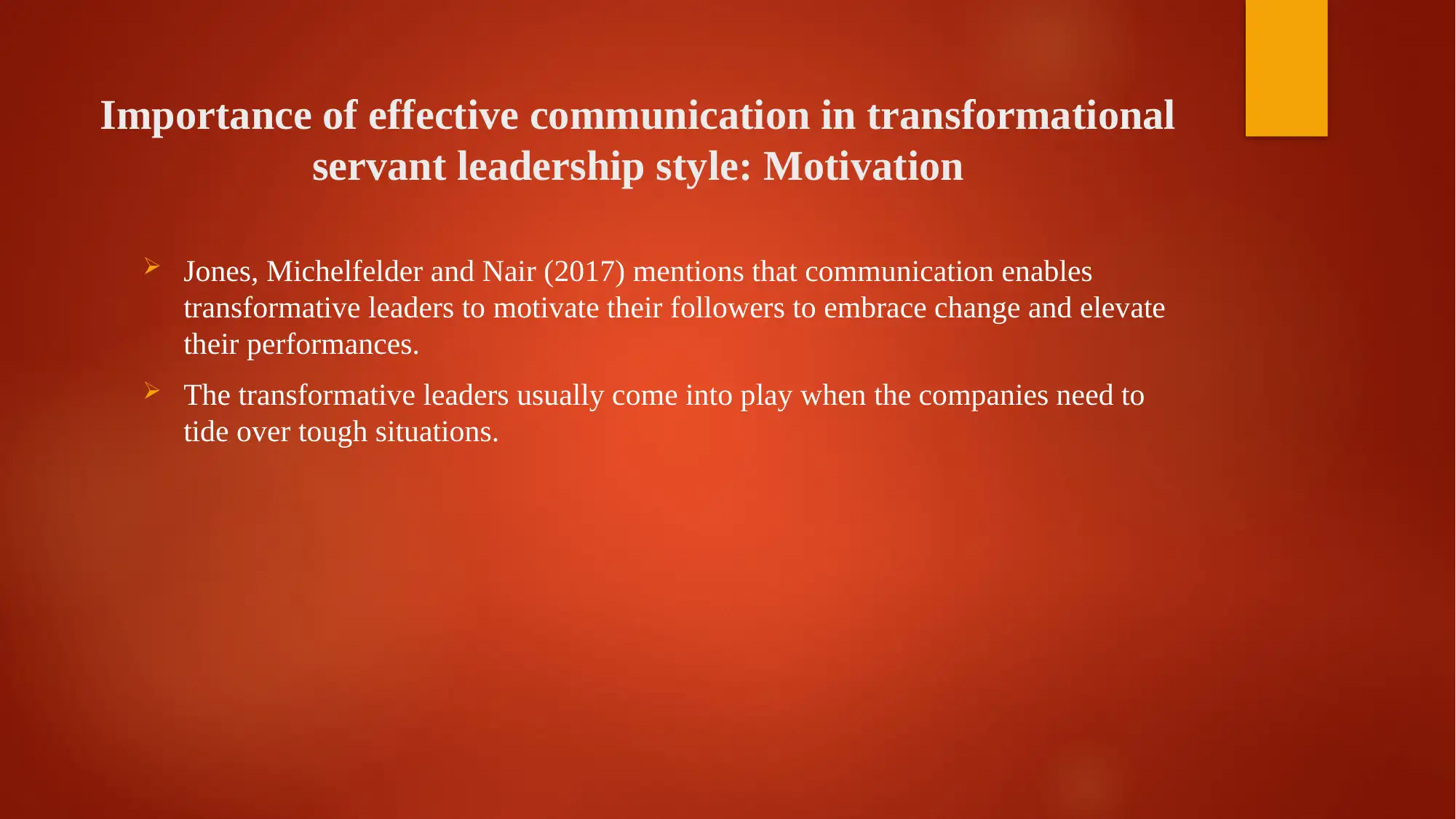
Importance of effective communication in transformational
servant leadership style: Motivation
Jones, Michelfelder and Nair (2017) mentions that communication enables
transformative leaders to motivate their followers to embrace change and elevate
their performances.
The transformative leaders usually come into play when the companies need to
tide over tough situations.
servant leadership style: Motivation
Jones, Michelfelder and Nair (2017) mentions that communication enables
transformative leaders to motivate their followers to embrace change and elevate
their performances.
The transformative leaders usually come into play when the companies need to
tide over tough situations.
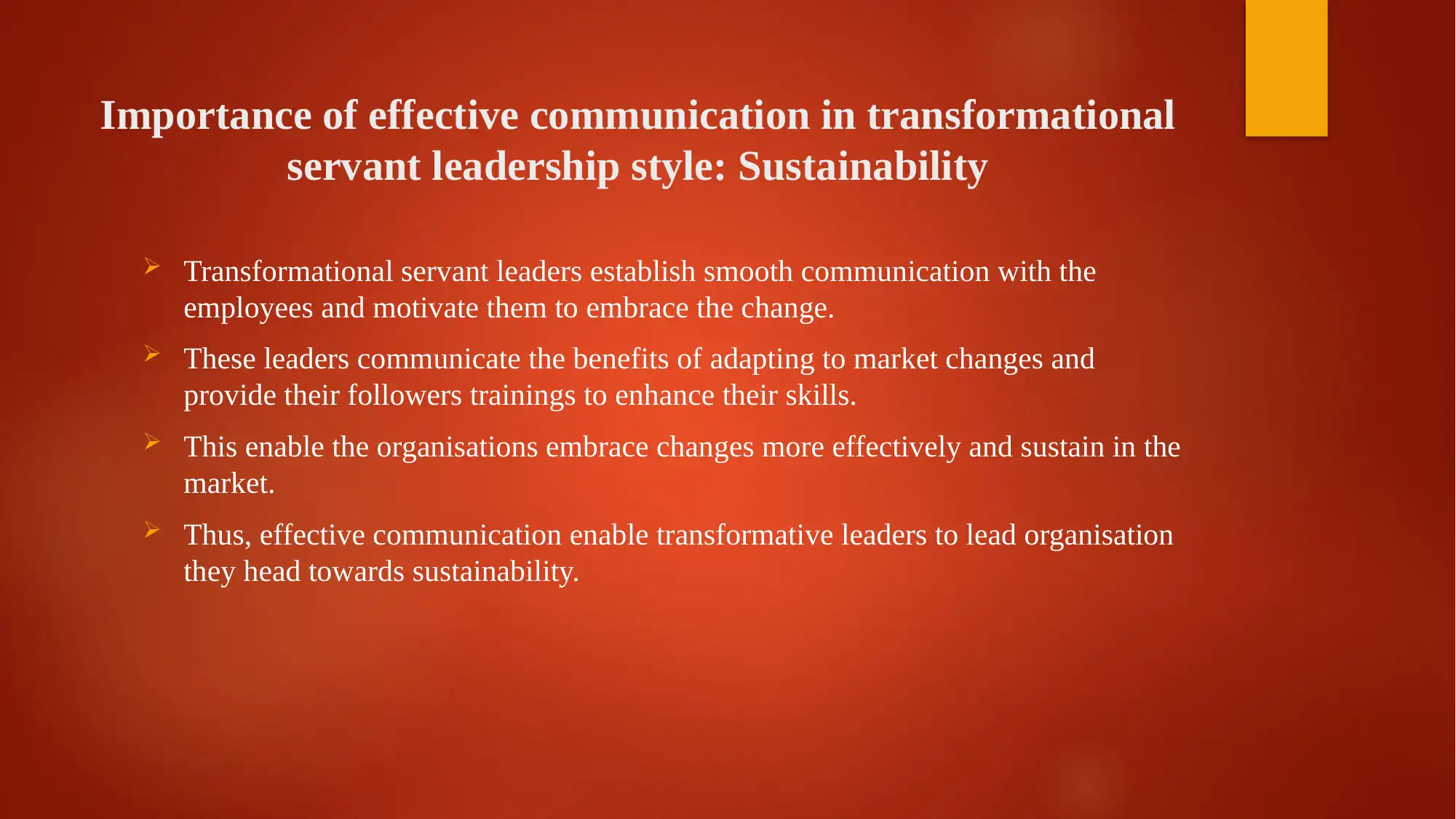
Importance of effective communication in transformational
servant leadership style: Sustainability
Transformational servant leaders establish smooth communication with the
employees and motivate them to embrace the change.
These leaders communicate the benefits of adapting to market changes and
provide their followers trainings to enhance their skills.
This enable the organisations embrace changes more effectively and sustain in the
market.
Thus, effective communication enable transformative leaders to lead organisation
they head towards sustainability.
servant leadership style: Sustainability
Transformational servant leaders establish smooth communication with the
employees and motivate them to embrace the change.
These leaders communicate the benefits of adapting to market changes and
provide their followers trainings to enhance their skills.
This enable the organisations embrace changes more effectively and sustain in the
market.
Thus, effective communication enable transformative leaders to lead organisation
they head towards sustainability.
⊘ This is a preview!⊘
Do you want full access?
Subscribe today to unlock all pages.

Trusted by 1+ million students worldwide
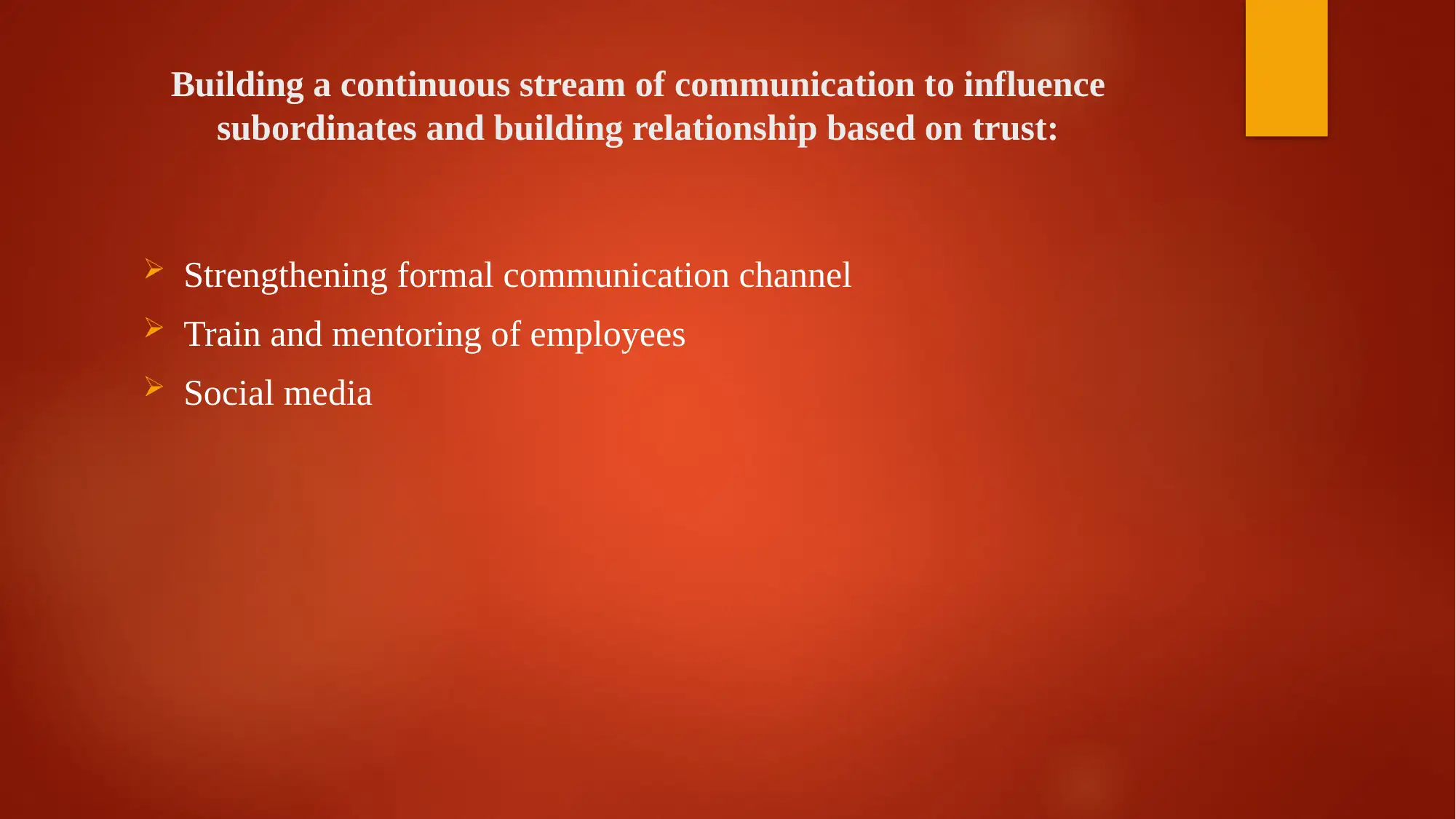
Building a continuous stream of communication to influence
subordinates and building relationship based on trust:
Strengthening formal communication channel
Train and mentoring of employees
Social media
subordinates and building relationship based on trust:
Strengthening formal communication channel
Train and mentoring of employees
Social media
Paraphrase This Document
Need a fresh take? Get an instant paraphrase of this document with our AI Paraphraser
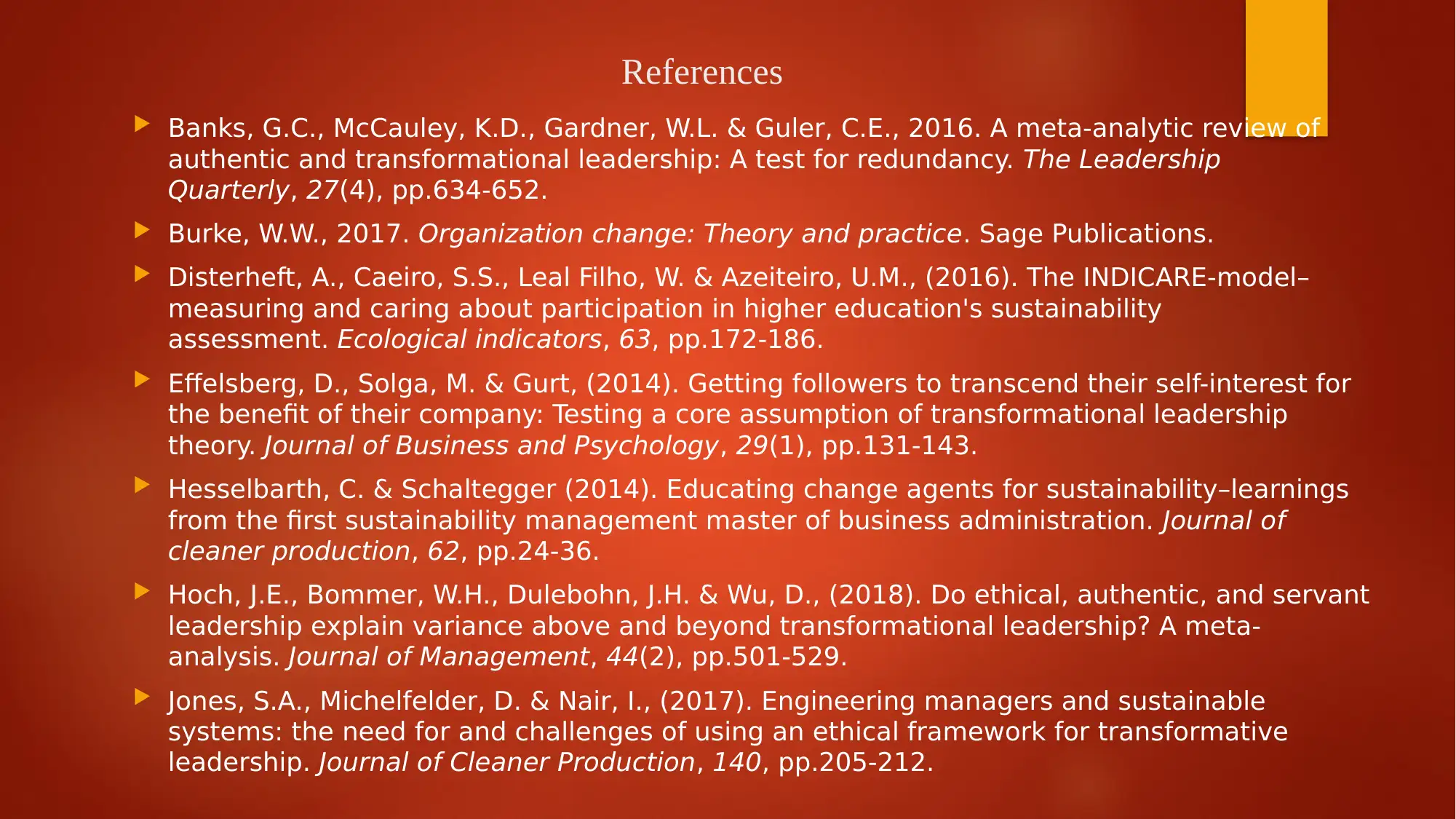
References
Banks, G.C., McCauley, K.D., Gardner, W.L. & Guler, C.E., 2016. A meta-analytic review of
authentic and transformational leadership: A test for redundancy. The Leadership
Quarterly, 27(4), pp.634-652.
Burke, W.W., 2017. Organization change: Theory and practice. Sage Publications.
Disterheft, A., Caeiro, S.S., Leal Filho, W. & Azeiteiro, U.M., (2016). The INDICARE-model–
measuring and caring about participation in higher education's sustainability
assessment. Ecological indicators, 63, pp.172-186.
Effelsberg, D., Solga, M. & Gurt, (2014). Getting followers to transcend their self-interest for
the benefit of their company: Testing a core assumption of transformational leadership
theory. Journal of Business and Psychology, 29(1), pp.131-143.
Hesselbarth, C. & Schaltegger (2014). Educating change agents for sustainability–learnings
from the first sustainability management master of business administration. Journal of
cleaner production, 62, pp.24-36.
Hoch, J.E., Bommer, W.H., Dulebohn, J.H. & Wu, D., (2018). Do ethical, authentic, and servant
leadership explain variance above and beyond transformational leadership? A meta-
analysis. Journal of Management, 44(2), pp.501-529.
Jones, S.A., Michelfelder, D. & Nair, I., (2017). Engineering managers and sustainable
systems: the need for and challenges of using an ethical framework for transformative
leadership. Journal of Cleaner Production, 140, pp.205-212.
Banks, G.C., McCauley, K.D., Gardner, W.L. & Guler, C.E., 2016. A meta-analytic review of
authentic and transformational leadership: A test for redundancy. The Leadership
Quarterly, 27(4), pp.634-652.
Burke, W.W., 2017. Organization change: Theory and practice. Sage Publications.
Disterheft, A., Caeiro, S.S., Leal Filho, W. & Azeiteiro, U.M., (2016). The INDICARE-model–
measuring and caring about participation in higher education's sustainability
assessment. Ecological indicators, 63, pp.172-186.
Effelsberg, D., Solga, M. & Gurt, (2014). Getting followers to transcend their self-interest for
the benefit of their company: Testing a core assumption of transformational leadership
theory. Journal of Business and Psychology, 29(1), pp.131-143.
Hesselbarth, C. & Schaltegger (2014). Educating change agents for sustainability–learnings
from the first sustainability management master of business administration. Journal of
cleaner production, 62, pp.24-36.
Hoch, J.E., Bommer, W.H., Dulebohn, J.H. & Wu, D., (2018). Do ethical, authentic, and servant
leadership explain variance above and beyond transformational leadership? A meta-
analysis. Journal of Management, 44(2), pp.501-529.
Jones, S.A., Michelfelder, D. & Nair, I., (2017). Engineering managers and sustainable
systems: the need for and challenges of using an ethical framework for transformative
leadership. Journal of Cleaner Production, 140, pp.205-212.
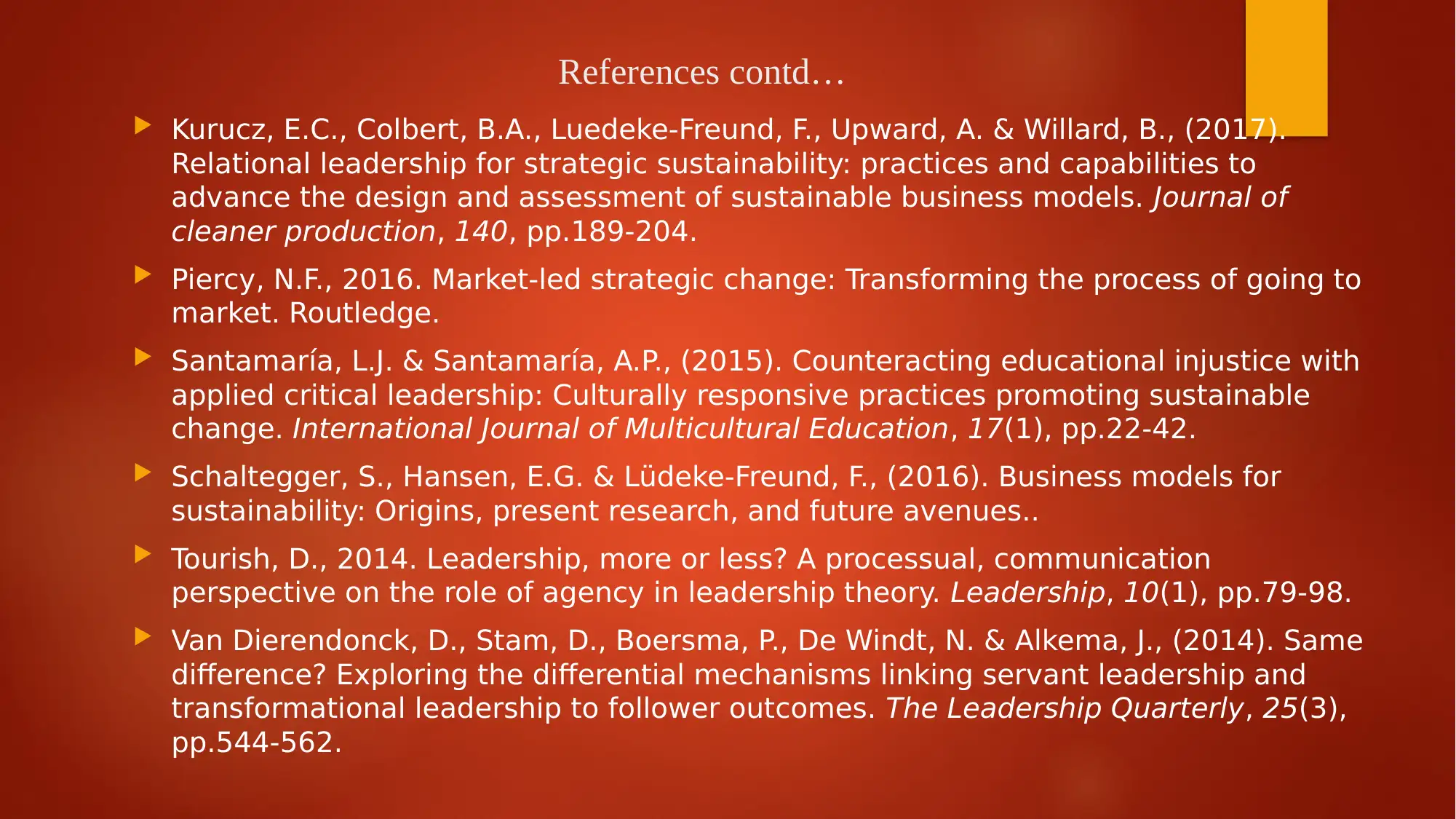
References contd…
Kurucz, E.C., Colbert, B.A., Luedeke-Freund, F., Upward, A. & Willard, B., (2017).
Relational leadership for strategic sustainability: practices and capabilities to
advance the design and assessment of sustainable business models. Journal of
cleaner production, 140, pp.189-204.
Piercy, N.F., 2016. Market-led strategic change: Transforming the process of going to
market. Routledge.
Santamaría, L.J. & Santamaría, A.P., (2015). Counteracting educational injustice with
applied critical leadership: Culturally responsive practices promoting sustainable
change. International Journal of Multicultural Education, 17(1), pp.22-42.
Schaltegger, S., Hansen, E.G. & Lüdeke-Freund, F., (2016). Business models for
sustainability: Origins, present research, and future avenues..
Tourish, D., 2014. Leadership, more or less? A processual, communication
perspective on the role of agency in leadership theory. Leadership, 10(1), pp.79-98.
Van Dierendonck, D., Stam, D., Boersma, P., De Windt, N. & Alkema, J., (2014). Same
difference? Exploring the differential mechanisms linking servant leadership and
transformational leadership to follower outcomes. The Leadership Quarterly, 25(3),
pp.544-562.
Kurucz, E.C., Colbert, B.A., Luedeke-Freund, F., Upward, A. & Willard, B., (2017).
Relational leadership for strategic sustainability: practices and capabilities to
advance the design and assessment of sustainable business models. Journal of
cleaner production, 140, pp.189-204.
Piercy, N.F., 2016. Market-led strategic change: Transforming the process of going to
market. Routledge.
Santamaría, L.J. & Santamaría, A.P., (2015). Counteracting educational injustice with
applied critical leadership: Culturally responsive practices promoting sustainable
change. International Journal of Multicultural Education, 17(1), pp.22-42.
Schaltegger, S., Hansen, E.G. & Lüdeke-Freund, F., (2016). Business models for
sustainability: Origins, present research, and future avenues..
Tourish, D., 2014. Leadership, more or less? A processual, communication
perspective on the role of agency in leadership theory. Leadership, 10(1), pp.79-98.
Van Dierendonck, D., Stam, D., Boersma, P., De Windt, N. & Alkema, J., (2014). Same
difference? Exploring the differential mechanisms linking servant leadership and
transformational leadership to follower outcomes. The Leadership Quarterly, 25(3),
pp.544-562.
⊘ This is a preview!⊘
Do you want full access?
Subscribe today to unlock all pages.

Trusted by 1+ million students worldwide

THANK YOU
1 out of 10
Related Documents
Your All-in-One AI-Powered Toolkit for Academic Success.
+13062052269
info@desklib.com
Available 24*7 on WhatsApp / Email
![[object Object]](/_next/static/media/star-bottom.7253800d.svg)
Unlock your academic potential
Copyright © 2020–2026 A2Z Services. All Rights Reserved. Developed and managed by ZUCOL.




